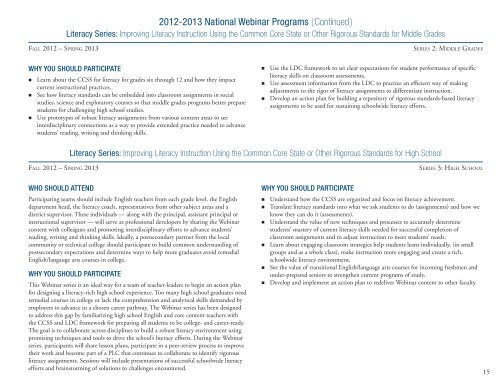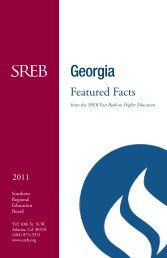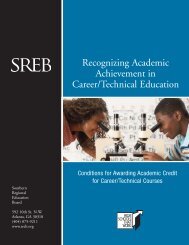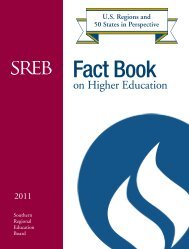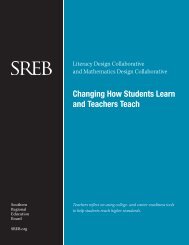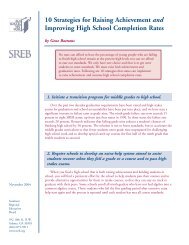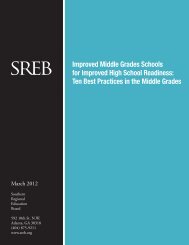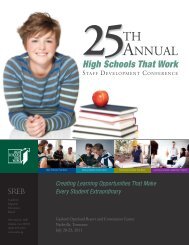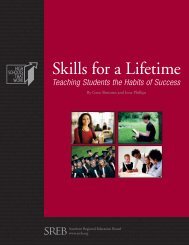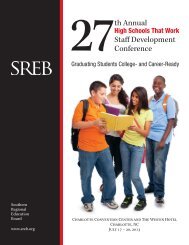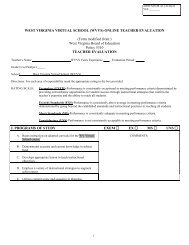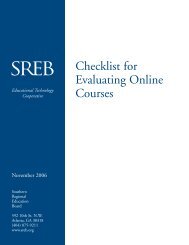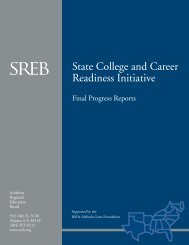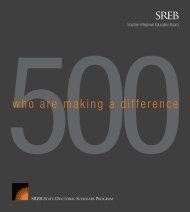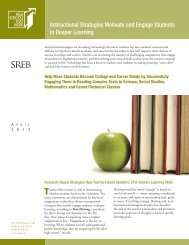<strong>2012</strong>-<strong>2013</strong> <strong>National</strong> Webinar <strong>Programs</strong> (Continued)Literacy Series: Improving Literacy Instruction Using the Common Core State or Other Rigorous Standards for Middle GradesFALL <strong>2012</strong> – SPRING <strong>2013</strong>SERIES 2: MIDDLE GRADESWHY YOU SHOULD PARTICIPATE• Learn about the CCSS for literacy for grades six through 12 and how they impactcurrent instructional practices.• See how literacy standards can be embedded into classroom assignments in socialstudies, science and exploratory courses so that middle grades programs better preparestudents for challenging high school studies.• Use prototypes of robust literacy assignments from various content areas to seeinterdisciplinary connections as a way to provide extended practice needed to advancestudents’ reading, writing and thinking skills.• Use the LDC framework to set clear expectations for student performance of specificliteracy skills on classroom assessments.• Use assessment information from the LDC to practice an efficient way of makingadjustments to the rigor of literacy assignments to differentiate instruction.• Develop an action plan for building a repository of rigorous standards-based literacyassignments to be used for sustaining schoolwide literacy efforts.Literacy Series: Improving Literacy Instruction Using the Common Core State or Other Rigorous Standards for High SchoolFALL <strong>2012</strong> – SPRING <strong>2013</strong>SERIES 3: HIGH SCHOOLWHO SHOULD ATTENDParticipating teams should include English teachers from each grade level, the Englishdepartment head, the literacy coach, representatives from other subject areas and adistrict supervisor. These individuals — along with the principal, assistant principal orinstructional supervisor — will serve as professional developers by sharing the Webinarcontent with colleagues and promoting interdisciplinary efforts to advance students’reading, writing and thinking skills. Ideally, a postsecondary partner from the localcommunity or technical college should participate to build common understanding ofpostsecondary expectations and determine ways to help more graduates avoid remedialEnglish/langauge arts courses in college.WHY YOU SHOULD PARTICIPATEThis Webinar series is an ideal way for a team of teacher-leaders to begin an action planfor designing a literacy-rich high school experience. Too many high school graduates needremedial courses in college or lack the comprehension and analytical skills demanded byemployers to advance in a chosen career pathway. The Webinar series has been designedto address this gap by familiarizing high school English and core content teachers withthe CCSS and LDC framework for preparing all students to be college- and career-ready.The goal is to collaborate across disciplines to build a robust literacy environment usingpromising techniques and tools to drive the school’s literacy efforts. During the Webinarseries, participants will share lesson plans, participate in a peer-review process to improvetheir work and become part of a PLC that continues to collaborate to identify rigorousliteracy assignments. Sessions will include presentations of successful schoolwide literacyefforts and brainstorming of solutions to challenges encountered.WHY YOU SHOULD PARTICIPATE• Understand how the CCSS are organized and focus on literacy achievement.• Translate literacy standards into what we ask students to do (assignments) and how weknow they can do it (assessments).• Understand the value of new techniques and processes to accurately determinestudents’ mastery of current literacy skills needed for successful completion ofclassroom assignments and to adjust instruction to meet students’ needs.• Learn about engaging classroom strategies help students learn individually, (in smallgroups and as a whole class), make instruction more engaging and create a rich,schoolwide literacy environment.• See the value of transitional English/language arts courses for incoming freshmen andunder-prepared seniors to strengthen current programs of study.• Develop and implement an action plan to redeliver Webinar content to other faculty.15
<strong>2012</strong>-<strong>2013</strong> <strong>National</strong> Leadership <strong>Development</strong> SeriesOVERVIEWThe SREB Learning-Centered Leadership Program’s curriculum of online courses engagesprincipals and school leadership teams in professional development through a Web-basedlearning environment of study, collaboration, reflection and application of learning toauthentic school reform efforts. These courses address a range of topics, from improvingcurriculum and instruction to improving the school as a system. Each course requiresparticipants to apply acquired skills and strategies to a real problem in their schools relatedto student performance. Participants will analyze the causes of the problem, arrive atsolutions to the problem and develop an action plan with implementation strategies toaddress the problem.These courses will be available to individuals, teams and cohorts beginning in August <strong>2012</strong>:• Using Root Cause Analysis to Create a High-Performance Learning Culture• Assessing Academic Rigor in School and Classroom Practices• Organizing Resources for a Personalized Learning Environment• Designing Assessment to Improve Student Learning• Mapping the Curriculum to Grade-Level and College-Readiness Standards• Leading Schoolwide Literacy Initiatives• Building Instructional Leadership Teams to Lead Change for Student SuccessThe curriculum of online leadership training courses is rooted in education researchand based on SREB’s 13 Critical Success Factors — practices derived from research andassociated with principals who have succeeded in raising student achievement in high-needschools. Courses are built around clear objectives and key strategies that integrate real-worldproblems to build knowledge and skills in instructional leadership. They also focus onwhat school leaders must know and be able to do to improve instruction and raise studentachievement. Training in a variety of leadership topics can support principals in areasidentified through leadership evaluation processes as needing improvement.WHO SHOULD ATTENDPrincipals, teacher leaders, curriculum specialists and aspiring leaders will gain knowledgeand skills from these courses to build and support a rigorous schoolwide learning culture.Teachers will gain practical skills, strategies and tools to ensure high levels of rigor inplanning, teaching and assessing course content. Training can accommodate participationby individuals or engage teachers and administrators in developing and improvingfunctional leadership teams.COURSE STRUCTURE$295 PER INDIVIDUAL, PER COURSEEach online leadership development course includes a mix of online communicationsand required “real time” meetings with the course facilitator. Meeting dates and timesare determined at the beginning of the course based upon the availability of the coursefacilitator and participants.Online courses typically last eight weeks and are divided into seven or eight units. Eachunit requires four to five hours of work to be completed within each week. Whether takingcourses as individuals or as part of a school team, participants will gain the most valuefrom these courses by committing to regular online engagement, completing assignmentsand applying learning to a course project based on an identified problem in their school.Following successful review of the course project, a certificate of completion will beawarded that may enable the participant to receive professional development credits orlicensure renewal. In order to ensure an optimal learning experience for all members of theclass, no students may be dropped from or added to a class 10 days after it has begun.This policy will be strictly enforced.The following courses will be available for this option during the <strong>2012</strong>-<strong>2013</strong> academic year:• Using Root Cause Analysis to Create a High-Performance Learning CultureOctober 2 – November 6, <strong>2012</strong>; January 7 – March 1, <strong>2013</strong>• Assessing Academic Rigor in School and Classroom PracticesAugust 13 – October 5, <strong>2012</strong>; November 13, <strong>2012</strong> – January 2, <strong>2013</strong>• Organizing Resources for a Personalized Learning EnvironmentJanuary 8 – February 5, <strong>2013</strong>• Designing Assessment to Improve Student LearningNovember 26, <strong>2012</strong> – January 18, <strong>2013</strong>; January 8 – February 5, <strong>2013</strong>• Mapping the Curriculum to Grade-Level and College-Readiness StandardsFebruary 12 – March 20, <strong>2013</strong>• Leading Schoolwide Literacy InitiativesMarch 19 – May 15, <strong>2013</strong>• Building Instructional Leadership Teams to Lead Change for Student SuccessSeptember 10 – November 1, <strong>2012</strong>; March 11 – May 3, <strong>2013</strong>;March 19 – May 15, <strong>2013</strong>16


